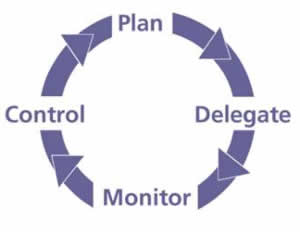PRINCE2 2009 - Introduction part 2b
of the Cabinet Office under delegated authority from the Controller of HMSO.
Introducing PRINCE2
What is it we wish to control?
There are six variables involved in any project, and therefore six aspects of project performance to be managed.
Costs
The project has to be affordable and, though we may start out with a particular budget in mind, there will be many factors which can lead to overspending and, perhaps, some opportunities to cut costs.
Timescales
Allied to this, and probably the next most-frequent question asked of a Project Manager, is: ‘When will it be finished?’.
Quality
Finishing on time and within budget is not much consolation if the result of the project doesn’t work.
In PRINCE2® terms, the project’s products must be fit for purpose.
Scope
Exactly what will the project deliver?
Without knowing it, the various parties involved in a project can very often be talking at cross-purposes about this.
The customer may assume that, for instance, a fitted kitchen and/or bathroom is included in the price of the house, whereas the supplier views these as ‘extras’.
On large-scale projects, scope definition is much more subtle and complex.
There must be agreement on the project’s scope and the Project Manager needs to have a detailed understanding of what is and what is not within the scope. The Project Manager should take care not to deliver beyond the scope as this is a common source of delays, overspends and uncontrolled change (‘scope creep’).
Risk
All projects entail risks but exactly how much risk are we prepared to accept?
Should we build the house near the site of a disused mine, which may be prone to subsidence?
If we decide to go ahead, is there something we can do about the risk?
Maybe insure against it or have thorough surveys carried out?
Benefits
Perhaps most often overlooked is the question, ‘Why are we doing this?’
It’s not enough to build the house successfully on time, within budget and to quality specifications if, in the end, we can’t sell or rent it at a profit or live in it happily.
The Project Manager has to have a clear understanding of the purpose of the project as an investment and make sure that what the project delivers is consistent with achieving the desired return.
PRINCE2 is an integrated framework of processes and themes that addresses the planning, delegation, monitoring and control of all these six aspects of project performance.
PRINCE2 2009 describes project monitoring within the Progress theme.
The purpose of the Progress theme is to establish mechanisms to monitor and compare actual achievements against those planned; provide a forecast for the project objectives and the project’s continued viability; and control any unacceptable deviations.
Two of the principles of PRINCE2 are managing by stages and continued business justification.
The Progress theme provides the mechanisms for monitoring and control, enabling the critical assessment of ongoing viability.
[see Progress - Purpose]
PRINCE2® is a Registered Trade Mark of the Office of Government Commerce in the United Kingdom and other countries.
Managing Successful Projects with PRINCE2 - 2005 edition
Managing successful Projects with PRINCE2 – 2009 edition
Directing Projects with PRINCE2.
plus:
The Complete Project Management package.
And much more besides - at a fantastic price.


